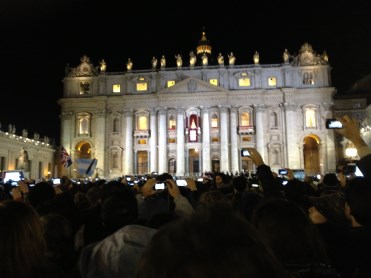Slotboodschap van de bisschoppensynode
Persconferentie kardinaal Eijk

Zondag 19 oktober wordt de buitengewone bisschoppensynode in zekere zin afgesloten met de zaligverklaring van paus Paulus VI. Volgend jaar zal met het thema van huwelijk en gezin worden verder gegaan in een ‘gewone bisschoppensynode’, nadat eerder al een consistorie - een vergadering van de kardinalen - over dit onderwerp was gehouden. De synode heeft een slotboodschap uitgebracht en kardinaal Eijk heeft over zijn ervaringen gesproken. De synode en de paus, zo onderstreepte hij, hebben geen verandering van de leer voor ogen.
De bisschoppen hebben aan het einde van de bisschoppensynode over huwelijk en gezin een bemoedigende boodschap uitgebracht aan alle gehuwden en gezinnen die zich inzetten om ondanks allerlei moeilijkheden en offers trouw te blijven en zich in te zetten. Bijzondere aandacht wordt geschonken aan alle gezinnen die in bijzonder moeilijke omstandigheden leven, zoals de vele gezinnen die in armoede moeten leven en de ouders die met hun kinderen moeten vluchten. De synodevaders beklemtonen dat deze synode een eerste synode-stap is, waarin bijzondere aandacht is besteed aan de pastorale vraag hoe de Kerk mensen goed kan begeleiden en nabij zijn die gescheiden en hertrouwd zijn en aan vragen rond hun deelname aan sacramenten.
Ook kardinaal Willem Eijk heeft in een persconferentie op vrijdag 17 oktober verslag gedaan van zijn beleving van de synode, waarvan een verslag te vinden is op de website van de bisschoppenconferentie:
De slotboodschap van de synodevaders is zaterdagmorgen door de bisschoppen aangenomen. Hieronder volgt de Engelse tekst van deze boodschap.
Slotboodschap
We, Synod Fathers, gathered in Rome together with Pope Francis in the Extraordinary General Assembly of the Synod of Bishops, greet all families of the different continents and in particular all who follow Christ, the Way, the Truth, and the Life. We admire and are grateful for the daily witness which you offer us and the world with your fidelity, faith, hope, and love.
Each of us, pastors of the Church, grew up in a family, and we come from a great variety of backgrounds and experiences. As priests and bishops we have lived alongside families who have spoken to us and shown us the saga of their joys and their difficulties.
The preparation for this synod assembly, beginning with the questionnaire sent to the Churches around the world, has given us the opportunity to listen to the experience of many families. Our dialogue during the Synod has been mutually enriching, helping us to look at the complex situations which face families today.
We offer you the words of Christ: “Behold, I stand at the door and knock. If anyone hears my voice and opens the door, I will enter his house and dine with him, and he with me”. On his journeys along the roads of the Holy Land, Jesus would enter village houses. He continues to pass even today along the streets of our cities. In your homes there are light and shadow. Challenges often present themselves and at times even great trials. The darkness can grow deep to the point of becoming a dense shadow when evil and sin work into the heart of the family.
We recognise the great challenge to remain faithful in conjugal love. Enfeebled faith and indifference to true values, individualism, impoverishment of relationships, and stress that excludes reflection leave their mark on family life. There are often crises in marriage, often confronted in haste and without the courage to have patience and reflect, to make sacrifices and to forgive one another. Failures give rise to new relationships, new couples, new civil unions, and new marriages, creating family situations which are complex and problematic, where the Christian choice is not obvious.
We think also of the burden imposed by life in the suffering that can arise with a child with special needs, with grave illness, in deterioration of old age, or in the death of a loved one. We admire the fidelity of so many families who endure these trials with courage, faith, and love. They see them not as a burden inflicted on them, but as something in which they themselves give, seeing the suffering Christ in the weakness of the flesh.
We recall the difficulties caused by economic systems, by the “the idolatry of money and the dictatorship of an impersonal economy lacking a truly human purpose” which weakens the dignity of people. We remember unemployed parents who are powerless to provide basic needs for their families, and youth who see before them days of empty expectation, who are prey to drugs and crime.
We think of so many poor families, of those who cling to boats in order to reach a shore of survival, of refugees wandering without hope in the desert, of those persecuted because of their faith and the human and spiritual values which they hold. These are stricken by the brutality of war and oppression. We remember the women who suffer violence and exploitation, victims of human trafficking, children abused by those who ought to have protected them and fostered their development, and the members of so many families who have been degraded and burdened with difficulties. “The culture of prosperity deadens us…. all those lives stunted for lack of opportunity seem a mere spectacle; they fail to move us”. We call on governments and international organizations to promote the rights of the family for the common good.
Christ wanted his Church to be a house with doors always open to welcome everyone. We warmly thank our pastors, lay faithful, and communities who accompany couples and families and care for their wounds.
***
There is also the evening light behind the windowpanes in the houses of the cities, in modest residences of suburbs and villages, and even in mere shacks, which shines out brightly, warming bodies and souls. This light—the light of a wedding story—shines from the encounter between spouses: it is a gift, a grace expressed, as the Book of Genesis says, when the two are “face to face” as equal and mutual helpers. The love of man and woman teaches us that each needs the other in order to be truly self. Each remains different from the other that opens self and is revealed in the reciprocal gift. It is this that the bride of the Song of Songs sings in her canticle: “My beloved is mine and I am his… I am my beloved’s and my beloved is mine”.
This authentic encounter begins with courtship, a time of waiting and preparation. It is realized in the sacrament where God sets his seal, his presence, and grace. This path also includes sexual relationship, tenderness, intimacy, and beauty capable of lasting longer than the vigour and freshness of youth. Such love, of its nature, strives to be forever to the point of laying down one’s life for the beloved. In this light conjugal love, which is unique and indissoluble, endures despite many difficulties. It is one of the most beautiful of all miracles and the most common.
This love spreads through fertility and generativity, which involves not only the procreation of children but also the gift of divine life in baptism, their catechesis, and their education. It includes the capacity to offer life, affection, and values—an experience possible even for those who have not been able to bear children. Families who live this light-filled adventure become a sign for all, especially for young people.
This journey is sometimes a mountainous trek with hardships and falls. God is always there to accompany us. The family experiences his presence in affection and dialogue between husband and wife, parents and children, sisters and brothers. They embrace him in family prayer and listening to the Word of God—a small, daily oasis of the spirit. They discover him every day as they educate their children in the faith and in the beauty of a life lived according to the Gospel, a life of holiness. Grandparents also share in this task with great affection and dedication. The family is thus an authentic domestic Church that expands to become the family of families which is the ecclesial community. Christian spouses are called to become teachers of faith and of love for young couples as well.
Another expression of fraternal communion is charity, giving, nearness to those who are last, marginalized, poor, lonely, sick, strangers, and families in crisis, aware of the Lord’s word, “It is more blessed to give than to receive”. It is a gift of goods, of fellowship, of love and mercy, and also a witness to the truth, to light, and to the meaning of life.
The high point which sums up all the threads of communion with God and neighbor is the Sunday Eucharist when the family and the whole Church sits at table with the Lord. He gives himself to all of us, pilgrims through history towards the goal of the final encounter when “Christ is all and in all”. In the first stage of our Synod itinerary, therefore, we have reflected on how to accompany those who have been divorced and remarried and on their participation in the sacraments.
We Synod Fathers ask you walk with us towards the next Synod. The presence of the family of Jesus, Mary, and Joseph in their modest home hovers over you. United to the Family of Nazareth, we raise to the Father of all our petition for the families of the world:
Father, grant to all families the presence of strong and wise spouses who may be the source of a free and united family.
Father, grant that parents may have a home in which to live in peace with their families.
Father, grant that children may be a sign of trust and hope and that young people may have the courage to forge life-long, faithful commitments.
Father, grant to all that they may be able to earn bread with their hands, that they may enjoy serenity of spirit and that they may keep aflame the torch of faith even in periods of darkness.
Father, grant that we may all see flourish a Church that is ever more faithful and credible, a just and humane city, a world that loves truth, justice and mercy”.
















